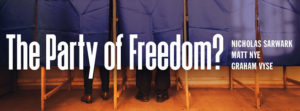CATO Unbound invited LNC Chair Nicholas Sarwark, chairman of the Republican Liberty Caucus Matt Nye, and journalist Graham Vyse to write essays on whether Libertarians should work through the Libertarian, Republican, or Democratic Parties to achieve freedom.
invited LNC Chair Nicholas Sarwark, chairman of the Republican Liberty Caucus Matt Nye, and journalist Graham Vyse to write essays on whether Libertarians should work through the Libertarian, Republican, or Democratic Parties to achieve freedom.
Mr. Sarwark started the conversation with “Be Libertarian: The Case for Our Own Party”:
American politics has devolved into competing colors of populism, with impossible promises and fear completely displacing substantive policy differences. There may have been a time when issues drove voter opinion, but team loyalty has pushed values and policy aside. Now the only relevant question for supporting a policy is whether the candidate or official supporting it is on the right team. Republicans will support gun control, trade protectionism, and farm subsidies if imposed by a Republican. Democrats will support deportation, mass incarceration, and corporate welfare so long as a Democrat’s in charge.
How should a libertarian, someone who wants peaceful people to be able to pursue their own happiness free from government interference, respond to this toxic political environment? Registering to vote as a Libertarian, joining and supporting the Libertarian Party, and being a Libertarian candidate for public office are three actions you can take that will have a positive impact on our political environment and move our society in a more libertarian direction.
Due, in large part, to the Cold War fusionism of conservatives and libertarians against the communists, along with lip service to libertarian principles by a few Republicans, there are loud voices who advocate that libertarians should not join the Libertarian Party. Their core thesis is that libertarians can have greater political impact in trying to change the Republican Party from the inside. If the experience of Ron Paul in 2008 and 2012 was not sufficient evidence that the GOP hates libertarians, the complete takeover of the GOP by a protectionist president should provide the final nail in the coffin of that theory.
Click here to read the rest of Mr. Sarwark’s essay.
Click here to read all of the essays and responses.
